Isaac Newton’s very first law of motion teaches us that objects at rest tend to stay at rest unless acted on by an outside force. For junk or abandoned vehicles, this can be particularly problematic, said Katie Koester, director of Juneau’s Engineering and Public Works Department.
“I do think Juneau is unique because cars have to come in by boat,” Koester said. “Junk vehicles are a concern in lots of places — people abandoning vehicles and bodies of water.”
For junk vehicles, the city offers its RecycleWorks program, which lets owners take their cars to be disposed of at no cost, Koester said, after filling out a form, and meeting the requirements for the program, found on the city website. Skookum Recycling partners with the city to dispose of the vehicles.
[Authorities ID remains found near Seawalk]
“Vehicles get squished and barged out,” Koester said. “Skookum can only process a few vehicles a day because they don’t have a space to put ‘em.”
Over the last five years, the program has gone from handling 350 vehicles a year in 2017 to more than double that at 820 in 2021. The program is on track to dispose of more than 1,000 vehicles this year, Koester said.
“It definitely has taken off,” Koester said. “We definitely see growth every year.”
Part of that could be that Juneau residents are now familiar with the program and how it works, Koester said. The department is also looking to help clear junk vehicles from public areas by making it easier for owners to dispose of them. Abandoned vehicles, which are distinct from junk vehicles in a legal sense, are more difficult to deal with, Koester said, taking up space in the city’s impound lot.
“A junk vehicle according to state statute has no value. It’s the same as trash. A junk vehicle on public property, we do still have to provide notice, but we can dispose of that,” Koester said. “That abandoned vehicle requires more due process. It has to have been abandoned for 30 days and there has to be a notice period of 30 days.”
Now, Engineering and Public Works is looking toward the future, and helping to prevent junk cars from being disposed of in public areas, such as parking lots, harbor areas or trailheads, by making it easier for Juneau residents to dispose of their dilapidated vehicles.
“The problem is that the impound lot is full. There’s no place to put vehicles,” Koester said. “How do we dispose of these vehicles?”
The impound lot, run by the Juneau Police Department, is located in Lemon Creek, and houses vehicles towed as junk or abandoned as well as cars impounded for criminal reasons. Lack of space is a perennial issue, said Lt. Krag Campbell.
“It’s been a problem for us,” Campbell said. “Our impound lot has limited space.”
Impounding vehicles in place while they await disposal is a practice already in use by some departments, including Docks and Harbors, said Koester.
“We’re still thinking about creative ways to solve this problem without jeopardizing the success of this program,” Koester said. “We’ve seen it expand even from last year.”
Koester recently spoke to the Public Works and Facilities Committee of Juneau’s Assembly about possible future directions for the vehicle recycling program.
“The city gets a lot of constituents who call in and say these vehicles are taking up parking. Parking in Juneau is a hot commodity,” Koester said. “It can be in the way of plowing and stuff like that. We can remove the vehicle if it presents a hazard.”
Proposals include waiving fees for towing based on the owner’s income, removing an obstacle to getting rid of a junk car; or allowing for disposal of larger vehicles. That could increase through-put while not dramatically expanding the program, said a memo from Engineering and Public Works.
“I suspect we’ll be taking another memo to the PWFC in January fleshing out these ideas and looking for their input,” Koester said.
• Contact reporter Michael S. Lockett at 757-621-1197 or mlockett@juneauempire.com.

